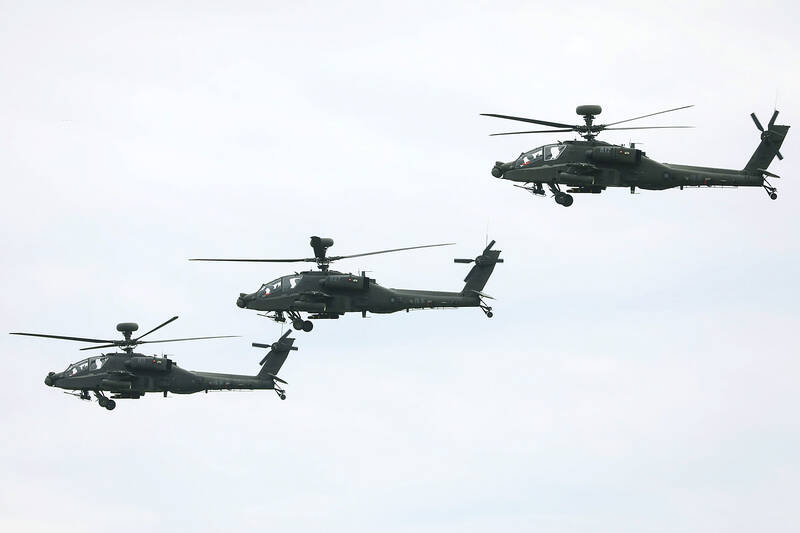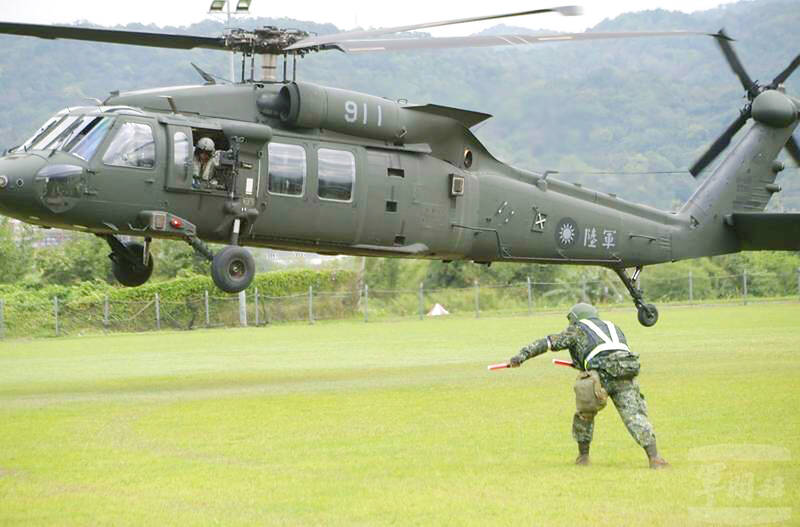Taiwan is to obtain maintenance parts for its AH-64E Apache attack helicopters, after the Republic of China Defense Mission to the US and the American Institute in Taiwan signed a NT$1.44 billion (US$47.1 million) deal that is to be in effect until Sept. 15, 2028.
Taiwan operates 29 Apaches.
The US is concerned that if China were to blockade Taiwan, it would be impossible to supply the nation with military equipment, natural gas, coal and other items, a military source said on condition of anonymity.

Photo: Reuters
The deal seeks to ensure stable supply of maintenance parts for the Apaches to keep them operational in a wartime scenario, the source said.
The deal came after the Control Yuan last month said that its members had visited the Army Aviation and Special Forces Command’s 601st Brigade.
They were briefed on the capabilities of the military’s helicopters, including Apaches and UH-60M Black Hawks, and its plans to boost the retention of pilots and communication specialists.

Photo courtesy of the Ministry of the Interior
During the briefing, Control Yuan member Lin Wen-cheng (林文程) focused on whether Boeing Co and Sikorsky Aircraft Corp are planning to authorize Taiwan-based repair facilities for Apaches and Black Hawks, as well as flight training regimens and the supply of replacement parts for several helicopter models, it said in a news release.
Control Yuan member Pu Chung-cheng (浦忠成) focused on the military’s plans to obtain more Apaches, as well as the wages the army’s fixed-wing aircraft pilots receive in comparison with their peers in the air force.
Pu also inquired about the benefits soldiers at the command receive, as well as promotion opportunities and retirement plans.
Control Yuan member Lai Ting-ming (賴鼎銘) focused on the Apache fleet’s munition reserves.
The news release did not comment on the military command’s answers to the members’ questions.

Taiwan is projected to lose a working-age population of about 6.67 million people in two waves of retirement in the coming years, as the nation confronts accelerating demographic decline and a shortage of younger workers to take their place, the Ministry of the Interior said. Taiwan experienced its largest baby boom between 1958 and 1966, when the population grew by 3.78 million, followed by a second surge of 2.89 million between 1976 and 1982, ministry data showed. In 2023, the first of those baby boom generations — those born in the late 1950s and early 1960s — began to enter retirement, triggering

ECONOMIC BOOST: Should the more than 23 million people eligible for the NT$10,000 handouts spend them the same way as in 2023, GDP could rise 0.5 percent, an official said Universal cash handouts of NT$10,000 (US$330) are to be disbursed late next month at the earliest — including to permanent residents and foreign residents married to Taiwanese — pending legislative approval, the Ministry of Finance said yesterday. The Executive Yuan yesterday approved the Special Act for Strengthening Economic, Social and National Security Resilience in Response to International Circumstances (因應國際情勢強化經濟社會及民生國安韌性特別條例). The NT$550 billion special budget includes NT$236 billion for the cash handouts, plus an additional NT$20 billion set aside as reserve funds, expected to be used to support industries. Handouts might begin one month after the bill is promulgated and would be completed within

NO CHANGE: The TRA makes clear that the US does not consider the status of Taiwan to have been determined by WWII-era documents, a former AIT deputy director said The American Institute in Taiwan’s (AIT) comments that World War-II era documents do not determine Taiwan’s political status accurately conveyed the US’ stance, the US Department of State said. An AIT spokesperson on Saturday said that a Chinese official mischaracterized World War II-era documents as stating that Taiwan was ceded to the China. The remarks from the US’ de facto embassy in Taiwan drew criticism from the Ma Ying-jeou Foundation, whose director said the comments put Taiwan in danger. The Chinese-language United Daily News yesterday reported that a US State Department spokesperson confirmed the AIT’s position. They added that the US would continue to

The National Development Council (NDC) yesterday unveiled details of new regulations that ease restrictions on foreigners working or living in Taiwan, as part of a bid to attract skilled workers from abroad. The regulations, which could go into effect in the first quarter of next year, stem from amendments to the Act for the Recruitment and Employment of Foreign Professionals (外國專業人才延攬及僱用法) passed by lawmakers on Aug. 29. Students categorized as “overseas compatriots” would be allowed to stay and work in Taiwan in the two years after their graduation without obtaining additional permits, doing away with the evaluation process that is currently required,